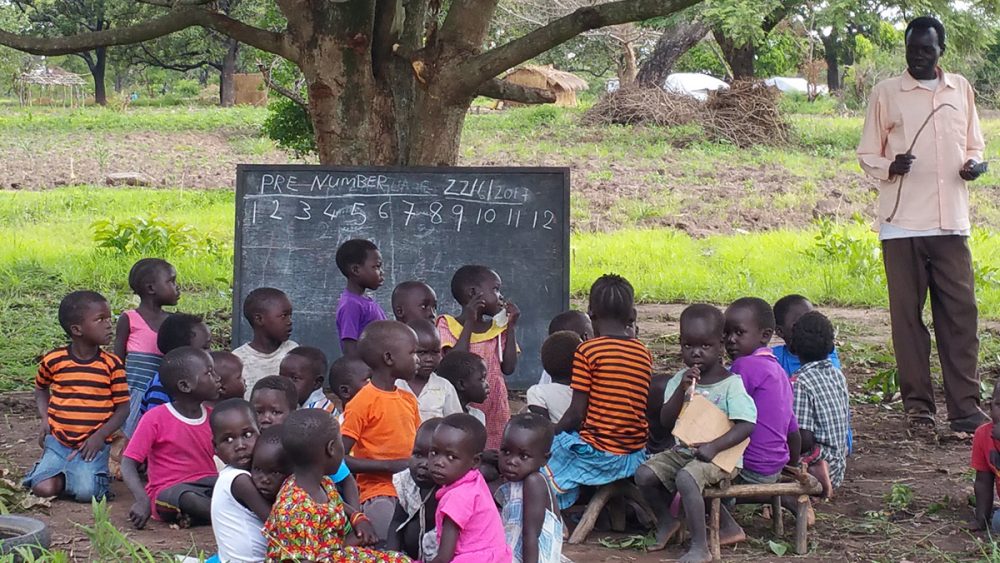Church the only source of aid and hope in South Sudan
Trying to help a nation plagued by civil war, famine and official opposition
Government militias in South Sudan are blocking the delivery of humanitarian supplies to those in the country’s internally displaced people (IDP) camps, according to Anglican Aid’s operations manager, Eddie Ozols, who has just returned from east Africa.
With farmers separated from their fields by the war and relief agencies unable to reach large parts of the country, the resulting famine has left an estimated 100,000 South Sudanese in need of aid and protection, according to aid agencies.
“When we went to meet the District Commissioner there were guys with guns slung over their shoulders…” – Eddie Ozols
Visiting an opposition militia group near several IDP camps in South Sudan, Ozols was told that the church was the only agency that had come in and offered hope.
“The only food aid that had come in was the money that we sent in April or May and that had arrived and they’d been able to buy food with that,” he tells Eternity.
“We’ve sent the second lot and hopefully we have a third lot we can send them.”
He says the government of President Salva Kiir does not trust aid agencies and will not allow them to operate outside the capital Juba.
Ozols quoted a District Commissioner allied with the ousted vice-president Riek Machar, who complained that a convoy from Juba had been organised but once it was out of the capital, the drivers were arrested and the aid just disappeared.
“When we went to meet the District Commissioner there were guys with guns slung over their shoulders … it was a ragtag army, there were no uniforms – these were just civilians who were given rifles and enlisted into the opposition, supposedly protecting their communities,” Ozols says.
‘Tell the world what’s going on, they need to know.’
Although the District Commissioner spoke without engaging eye contact, he seemed sincere when he said, “Let God open the windows.”
“The words of the District Commissioner were ‘tell the world what’s going on, they need to know, that people are being denied relief and support.’”
After driving for an hour along a forest track, Ozols arrived at one of three IDP camps in the area, where conditions were primitive.
“Makeshift plastic sheeting is the dominant housing. Small dwellings made of tree branches and whatever wood is available provide unsteady frames for blue plastic-coated shelters. Hopefully, the winds here are not too bad. These will not protect against the heavy downpours during wet season.”
“People choose to stay and take the risk of being attacked…” – Eddie Ozols
Ozols says the conditions in this camp were far worse than those he also visited in Uganda, where up to a million South Sudanese have fled their nation’s civil war.
“Yet people choose to stay and take the risk of being attacked, as some have farms locally or some distance away – and they could live in the IDP camp and hopefully go back and could harvest their crops,” says Ozols.
“The other reason given was they were sick of constant moving. Some of these people might have been in Uganda prior to independence, come back and then decided we’ve had enough, we want to take our chances.
“The fact that I was able to drive in and be assured that it was safe would suggest that the conflict is remote from them, and they would also get fair warning if it was time to go.”
The greatest need expressed by people in all the camps was education for their children, rather than food
In Uganda, Ozols visited a camp where the refugees were provided with a plot of land on which to grow food. While it was not enough to provide food year-round, it can supplement the meagre rations, which had been halved already and were about to be reduced to a quarter.
While food was the most urgent need, the greatest need expressed by people in all the camps was education for their children rather than food, says Ozols. Trauma counselling was also urgent, to address the spiritual emptiness of so many who have been forced to resettle.
After three years of war, Ozols prayed for peace with Bishop Emmanuel Murye Modi, Bishop of the Episcopal Church of South Sudan (Kajo-Keji Province). He led his entire diocese into exile in Uganda after six people were executed in January this year. The bishop told Ozols that tribalism is the root cause of the civil war.
These attacks … set in motion the world’s fastest-growing refugee crisis
Kiir is a member of the largest of the country’s 64 ethnic groups, the Dinka. He became president of the new nation in 2011 after his Sudan’s People’s Liberation Army (SPLA) fought a civil war against Sudan’s government. Machar was a member of the second-largest tribe, the Nuer.
In July 2013, Kiir fired Machar, who then announced he would challenge Kiir in upcoming elections, which were never held. That December, government forces killed large numbers of Nuer soldiers and civilians on the streets of Juba. Rebel militias loyal to Machar responded, massacring Dinkas in villages and towns in the north.
These attacks claimed tens of thousands of lives and set in motion the world’s fastest-growing refugee crisis. An estimated 834,000 South Sudanese have fled to Uganda and more than 15,000 refugees cross the southern border each week.
In late 2016, the UN Commission on Human Rights in South Sudan conducted two fact-finding missions and found that ethnic cleaning was under way. It is estimated that 3.6 million have fled their homes, and more than 7.5 million are in need of aid and protection.
Pray
Some prayer points to help
Pray for aid to reach people in South Sudan and that civil war and famine will end.




